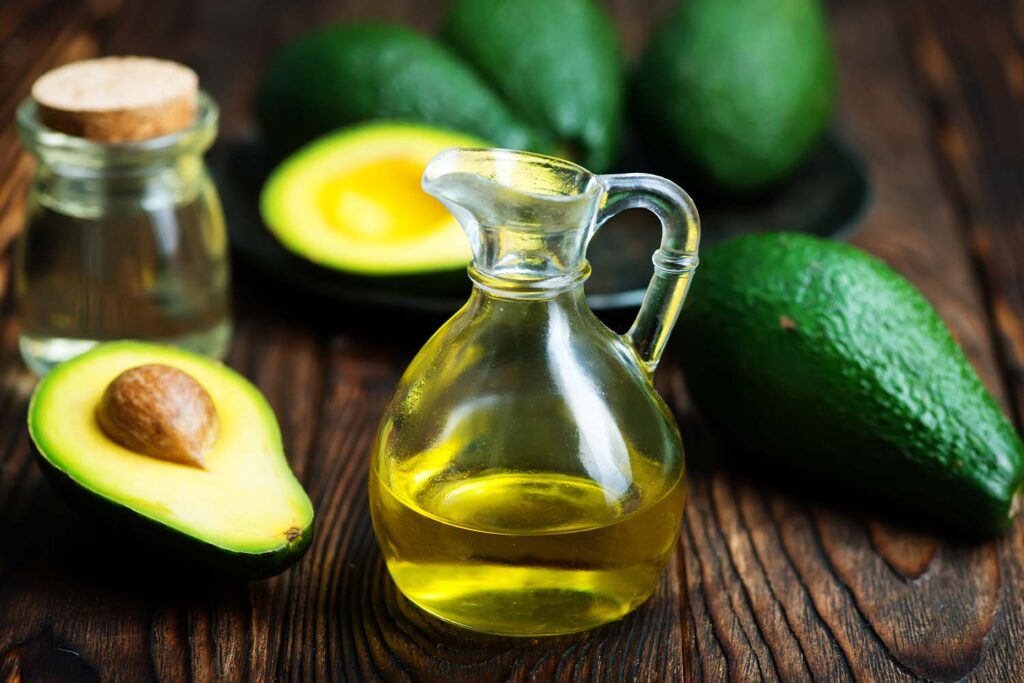Can Dogs Have Avocado Oil?

Can Dogs Have Avocado Oil?:- Our pets have an undeniable ability to tug at our heartstrings, especially when they look up at us with those irresistible puppy dog eyes. It’s hard not to cave in when they stare pleadingly for a bite of what we’re eating, convincing us that they’re absolutely starving.
However, as responsible pet owners, we must resist those adorable expressions and ensure we’re only giving our dogs food that’s safe and beneficial for them. This raises the question—can dogs eat avocado or avocado oil? Let’s explore this further to determine whether avocado oil is a healthy option for your canine friend.

What Is Avocado Oil, and Is It Safe for Dogs?
Avocado oil, extracted from the flesh of avocados, has become increasingly popular due to its potential health benefits for humans. Rich in healthy fats and vitamins, avocado oil is commonly used in cooking, skincare, and even as a dietary supplement. But when it comes to dogs, does avocado oil carry the same benefits, or is it something we should avoid?
The good news is that avocado oil, unlike the fruit’s leaves, seeds, and skin, does not contain persin—a toxin harmful to dogs. Persin is found in other parts of the avocado plant and can cause vomiting, diarrhea, and other severe health issues in dogs. Since the oil is extracted solely from the fruit’s flesh, it doesn’t pose the same level of toxicity. This means avocado oil is technically safe for dogs when used in moderation.
However, while avocado oil isn’t toxic, it’s important to consider its high-fat content. Like any oil, avocado oil is calorie-dense, and excessive consumption can lead to weight gain, gastrointestinal issues, and even pancreatitis in dogs. If you decide to give your dog a small amount of avocado oil, it should only be as an occasional treat and never a regular part of their diet.
Nutritional Benefits of Avocado Oil for Dogs
Avocado oil does offer some nutritional benefits that may be appealing to pet owners looking to improve their dog’s health. One of the key components of avocado oil is its high concentration of omega-3 fatty acids, which are essential for maintaining a shiny coat, healthy skin, and overall wellness. These healthy fats help combat inflammation and improve heart health, which is especially beneficial for aging dogs or those prone to joint issues.

In addition to omega-3s, avocado oil is rich in vitamin E, an antioxidant that plays a crucial role in skin health. For dogs with dry, itchy skin or dull coats, incorporating a small amount of avocado oil into their diet may provide some relief and improve their fur’s texture. However, there are other, safer options for achieving the same benefits.
Should You Add Avocado Oil to Your Dog’s Diet?
Although avocado oil can offer some health benefits, it’s not a necessary addition to your dog’s diet. High-quality dog food, especially those formulated with fresh ingredients, already provides a well-balanced array of essential nutrients, including the necessary fats, vitamins, and minerals your dog needs. There’s no requirement to add cooking oils like avocado oil to their meals.
If you do decide to give your dog avocado oil, it’s important to follow the 90/10 rule, which suggests that 90% of your dog’s daily nutrition should come from their regular dog food, while only 10% can be made up of treats or supplements. Oils of any kind should generally be excluded from this 10%, as they can upset your dog’s digestive system, leading to vomiting, diarrhea, or an upset stomach. Since avocado oil is high in fat, even small amounts can contribute to weight gain, which may cause further health issues down the line, especially in dogs prone to obesity.
Instead of giving your dog avocado oil, there are safer and more nutritious alternatives you can try, such as:
1. Fish Oil:
Fish oil, particularly salmon oil, is a safer and more effective source of omega-3 fatty acids for dogs. These healthy fats can improve your dog’s coat, reduce inflammation, and promote joint health.
2. Flaxseed Oil:
Flaxseed oil is another excellent source of omega-3 fatty acids and fiber, helping support digestion and skin health. It’s a safer option compared to avocado oil, and it’s widely recommended by veterinarians.

3. Fresh Vegetables:
You can offer plain steamed vegetables like green beans, carrots, or broccoli as part of the 10% treat allowance. These options provide valuable vitamins, fiber, and antioxidants without the added fat and calories.
4. Plain Scrambled Eggs:
Eggs are another great option if you’re looking for a high-protein treat. Cook them in a nonstick pan without butter or oil, and your dog will enjoy a nutritious, satisfying snack.
How to Use Avocado Oil Safely?
If you still want to try avocado oil, it’s crucial to introduce it gradually to your dog’s diet to avoid gastrointestinal upset. Start with a very small amount, like a teaspoon mixed into their food, and observe how they react. If your dog shows any signs of digestive issues, such as diarrhea or vomiting, discontinue use immediately and consult your veterinarian.
If your dog tolerates avocado oil well, you can give it occasionally, but keep the portion sizes minimal. Drizzling it over their food once a week may provide some of the benefits without overloading them with fat and calories. However, if you notice any adverse reactions or changes in your dog’s behavior after consuming avocado oil, it’s best to stop using it altogether.
Other Considerations for Using Avocado Oil
While avocado oil may seem like a natural and healthy addition, it should never replace a well-balanced dog food formulated for your pet’s specific life stage and nutritional needs. Your dog’s primary source of nutrition should always come from dog food, and any supplements or treats should be carefully chosen and given in moderation.
Moreover, the quality of the avocado oil you use matters. Opt for cold-pressed, high-quality avocado oil from trusted sources to ensure it is free of additives or harmful substances. Always keep in mind that oils should not make up a significant portion of your dog’s diet, no matter how healthy they seem for humans.
Conclusion
In summary, while avocado oil is technically safe for dogs and offers some nutritional benefits, it is not essential to their diet and should be used sparingly, if at all. High fat content and the potential for digestive issues make avocado oil a risky choice for regular consumption. Instead, consider safer alternatives like fish oil or flaxseed oil, and always prioritize a well-balanced, high-quality dog food for your pet’s nutritional needs.
Also Read:-




